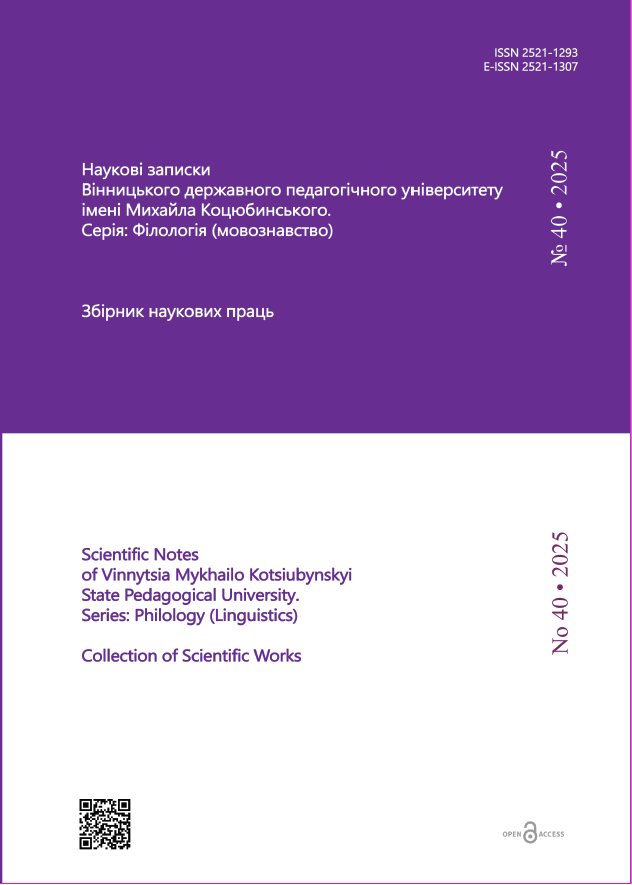The impact of information technology on modern English
DOI:
https://doi.org/10.31652/2521-1307-2025-40-02Keywords:
impact, information technology, modern English, neologisms, termsAbstract
The article analyses the peculiarities of modern English language, attempts are made to describe the main fields of the research. The pace of the development and expansion of the IT sector has increased significantly in recent years. This area has begun to have a significant impact on education, culture, relationships and on languages. In the context of the globalization of the modern world, a large number of words and abbreviations, which are actively used in modern life, appear. The appearance of new terms and neologisms is regularly recorded. The development of modern mass communication media leads to the birth of a huge number of new words and meanings. The purpose of the article is to analyze the impact of information technology on modern English language and to identify the main fields of the research; to describe the perspectives for further research of the impact of information technology on modern English language. The research material was a selection of articles from Internet sources. The author uses a descriptive method, general scientific methods (analysis, induction and deduction) and specific linguistic methods (semantic analysis and distribution analysis). The results of the research can be used in teaching modern English (lexical, phonetic, morphological and syntactic levels), ways of modern communication (including mobile applications and chats). Originality. The relevance of the article is determined by the impact of information technology on the modern English language, the lack of knowledge of new terms and neologisms in modern English. The novelty of the research is an attempt to describe the main fields of the research. The existing description of the peculiarities of modern English does not give an idea of the entire variety of all deviations. Conclusion. In our field of vision, information technology not only enriches the English language with new words and expressions, but also changes its structure and ways of applying it in everyday life. The research has shown that information technology contributes to the universalization of the English language, making it the main means of communication in international networks. This leads to the spread of Anglicisms in other languages and, conversely, to the borrowing of words from other languages into English. Information technology has not only changed the English language, but it also continues to change it. Changes are taking place at the lexical, phonetic, morphological and syntactic levels. This leads to the fact that the English language becomes different from what the society considers standard and correct. The question remains whether these changes are leading for the better or not. Nowadays, people are increasingly distancing themselves from reading and writing in standard English.
Among the perspectives of further research is the study of the impact of information technology on modern British and American languages separately.
References
Azhnyuk, B. M. (2011). Movni zminy na tli dekolonizatsii ta hlobolizatsii [Language changes against the background of decolonization and globalization]. Linguistics, No. 3, рp. 48-54. (in Ukrainian).
Zatsny, Yu. A. (2006). Suchasne anhlomovne suspilstvo i rozvytok slovnykovoho skladu anhliiskoi movy [Modern English-speaking society and the development of the vocabulary of the English language]. Zaporizhzhia : Zaporizhzhian National University, 218 р. (in Ukrainian).
Sytenko, O. O. (2019). Leksychni innovatsii u sferi informatsiinykh tekhnolohii anhliiskoi movy [Lexical innovations in the field of Information Technologies of the English language]. Typology of language meanings in diachronic and comparative aspects, No. 37. URL: https://r.donnu.edu.ua/xmlui/handle/123456789/997 (in Ukrainian.).
Skrylnik, N. A. (2012). Slovotvorchi modeli neolohizmiv v suchasnii anhliiskii movi [Word-forming models of neologisms in modern English]. Kryvyi Rih, 124 р. (in Ukrainian.).
Adams, J. (2007). Student perceptions of the impact of instant messaging on academic writing. Literacy Learning: The Middle Years, No. 2 (37). URL: https://www.questia.com/library/journal/1G1-166201100/student-perceptions-of-the-impact-of-instant-messaging (in English).
Ahmadi, M. R. (2018). The use of technology in English language learning: A literature review. International Journal of Research in English Education, No. 3 (2), рр. 115-125. https://doi.org/10.29252/ijree.3.2.115 (in English). DOI: https://doi.org/10.29252/ijree.3.2.115
Crystal, D. (2007). Language and the internet. Cambridge : Cambridge University Press, 318 p. (in English).
Herawati, B. B. (2024). The Information Technology's Impact on English Learning. Journal of Applied Linguistics, vol. 4, No. 1, рр. 41-48. URL: file:///D:/%D0%97%D0%90%D0%93%D0%A0%D0%A3%D0%97%D0%9A%D0%98/The_Information_Technologys_Impact_on_English_Lea.pdf (in English).
Tagliamonte, S. A. & Denis, D. (2008). Linguistic ruin? LOL! Instant messaging and teen language. American Speech, 83 (1), рр. 3-34. (in English). DOI: https://doi.org/10.1215/00031283-2008-001
Whig, V. (2022). How technology has influenced English Language. International Journal of English Learning and Teaching Skills, vol. 4, No 3, рр. 1-10. URL: https://www.ijeltsjournal.org/wp-content/uploads/2022/04/Paper-2_How-technology-has-influenced-English-Language.pdf. (in English). DOI: https://doi.org/10.15864/ijelts.4302









